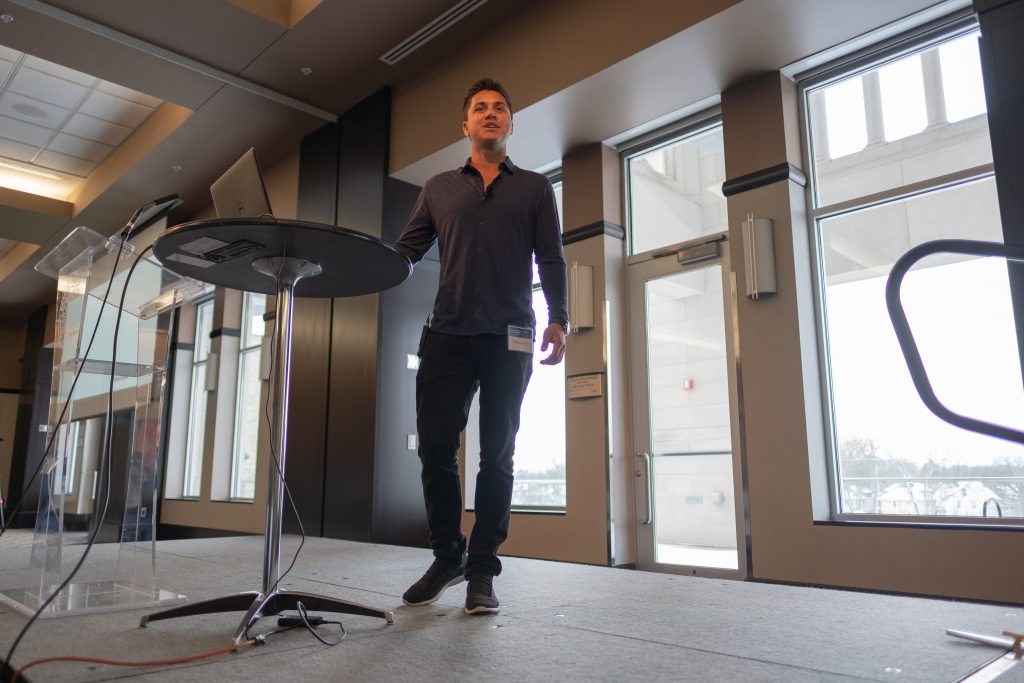
and Rebecca White came to campus to share
their entrepreneurial knowledge with students
and members of the Peoria community on
Thursday. Photo by William Craine.
Bradley’s Turner School of Entrepreneurship and Innovation gave students a learning opportunity.
The first annual Entrepreneurial Ecosystem and Convergence Conference was held on Thursday.
An entrepreneurial ecosystem is a collection of multiple elements in the area. These elements include a conducive culture for entrepreneurship, policies and leadership supporting it, availability of financial resources, human capital to staff the organization and a market willing to try new things.
William McDowell, organizer and facilitator of the conference and executive director of the Turner School of Entrepreneurship and Innovation, said he thought of the idea shortly after starting at Bradley, through talking to students and community members.
“The goal of this event is to get our students on campus and Bradley connected with the individuals that are operating here within our ecosystems,” McDowell said.
“Entrepreneurs, support organizations, other businesses that have been existing for a while, all these different groups are going to come together and get to know each other better and try to figure out better ways to help move this area, this region, forward.”
McDowell said the conference helps students understand how to connect with the local community and that they can bring the skill to wherever their job opportunities take them.
“[We have] some really good speakers that are … first of all, very motivational, but also have real stories of making something out of just an idea,” McDowell said.
Andrew Fischer, junior management and leadership major, said Kadri’s speech resonated with him and his brother’s story as an entrepreneur.
“He reminded me … of the challenges with a startup,” Fischer said. “The stresses of an entrepreneur are very apparent.”
Three guest speakers shared their entrepreneurial experiences. A founder and managing partner of Capella Partners, Romi Kadri; director of the center for entrepreneurial studies at Kenan-Flagler Business School in North Carolina, Ted Zoller; and co-founder of the Ministry of Supply startup, Kevin Rustagi.
McDowell met Kadri through a series of connections and thought he would be a great speaker for the conference. Kadri then asked Rustagi to also speak at the event.
“This is showing the power of connections and networks and working together. Suddenly, we’ve been able to populate this conference with some great speakers.”
McDowell said that working with external partners could help understanding a student’s own discipline and how it can connect with others.
“Hopefully these students will see some opportunities to be involved in what we’re doing in entrepreneurship and innovation,” McDowell said. “I’m also working in the convergence area now, where we’re promoting the idea that students can work on projects with other students who are from different a discipline than they are.”
Kadri spoke to the challenges and characteristics of an entrepreneur. He stressed that entrepreneurship is about innovation and finding a problem to fix.
“Students are in the best position to fix a problem,” Kadri said. “You can start a business from a dorm room.”
Kadri explained how big businesses use the 70/20/10 model. 70 percent of resources go to core business, 20 percent goes to expand core business and 10 percent goes to things completely outside the core business to invest in the future 70 percent.
However, startups must use 100 percent of their time and effort into something outside of their business because their core business doesn’t exist yet.
“The truth is though, if you’re willing to take all of that risk, take that massive burn-in, take the pressure and the humiliation and the loneliness of being in your own ideas … trying to solve something, trying to do something that no one has ever done before, you’re not crazy. You’re just an entrepreneur,” Kadri said.
Additionally, Kadri said those who want to be an entrepreneur will need passion for the problem they are trying to solve and persistence in finding a solution.
“If you find a problem in the world and you are passionate about it, then you are the best possible person to solve it,” Kadri said.




